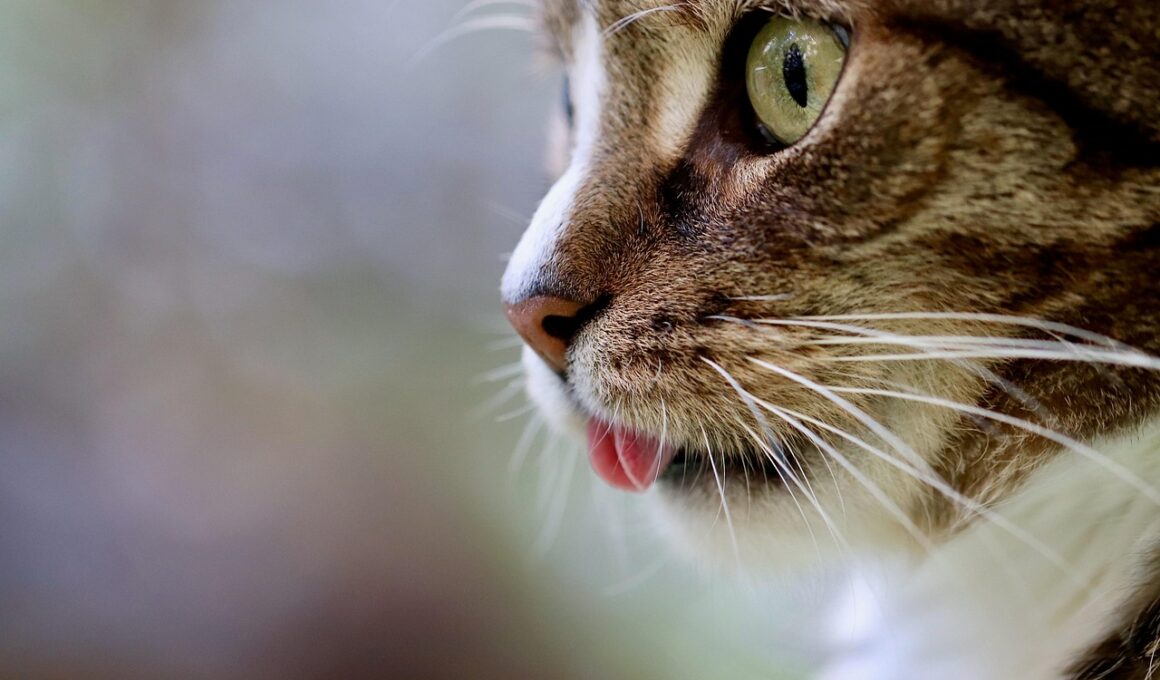The Role of Diet and Environment in Parasite Control for Cats
Controlling parasites in cats is vital for their overall health and well-being. Many pet owners often overlook the influence of diet and environment in preventing infestations. A balanced diet rich in essential nutrients can boost the immune system of your cat. With a strong immune system, cats can naturally resist certain parasites. Furthermore, high-quality cat food fortified with vitamins and minerals can reduce the likelihood of infections. It’s equally important to understand how the living environment interacts with dietary habits. Regular cleaning of litter boxes, bedding, and living spaces can eliminate parasite eggs. Cats who roam outdoors are at higher risk of exposure to parasites such as fleas and ticks. Therefore, while diet plays a crucial role, the environment must also be monitored closely. Indoor cats may fare better with strict parasite control measures. Additionally, interactions with other pets can also spread parasites, thus creating a comprehensive control strategy is essential. Lastly, veterinarians often recommend specific dietary supplements that provide extra protection against common parasites in felines.
While understanding the role of diet and environment in parasite control is vital, it is essential to also consider preventive treatments. Regular vaccinations and parasite preventatives can significantly influence a cat’s health and parasite exposure. Products may vary based on your geographical location and local parasite prevalence. Engaging your veterinarian in discussions about the best treatment plans will assist pet owners in ensuring their cats are adequately protected. Moreover, treating existing infestations is crucial, but prevention is always better than cure. Flea and tick treatments are paramount during warmer months as pests thrive in such conditions. Oral medications, topical treatments, and collars are all available, each with specific advantages. Many products are designed to be safe for concurrent use with dietary supplements, ensuring comprehensive care. Additionally, a well-balanced diet can improve the efficacy of these proactive treatments. This holistic approach, combining diet, effective treatments, and environmental management, ensures a safe and healthy life for your cat. The results may include a happier, healthier pet that is less prone to parasites, thus reducing stress for both the cat and owner.
Grooming Tips for Effective Parasite Management
One of the key elements in managing parasites is through regular grooming. Grooming your cat not only keeps their coat clean and tangle-free but also allows for early detection of parasites. Regular brushing helps remove loose fur that can harbor flea eggs and dirt. Furthermore, physical inspection of your cat’s coat can help identify fleas, ticks, and other pests. Depending on the breed, grooming frequencies may vary, but it is generally advisable to groom cats at least once a week. Older cats or those prone to certain conditions may require more frequent grooming. During the process, be sure to also check common parasite hotspots such as behind the ears and under the tail. In extreme cases, specialized flea combs may be used to eliminate even the tiniest of pests. Incorporating a consistent grooming regime not only enhances the bond between owner and pet but also serves as an excellent preventive measure. Moreover, grooming aids, like shampoos and sprays, can mitigate parasite risks while promoting a healthy and shiny coat.
Cats, as curious creatures, frequently expose themselves to different environments, which also increases the risk of parasitic infestations. Creating a safe indoor environment is paramount for effective parasite control. You can reduce exposure by limiting your cat’s access to outdoor areas where pests are abundant. If your cat enjoys being outdoors, consider building a secure outdoor enclosure that mitigates exposure to fleas, ticks and other parasites. Training plays a key part in controlling indoor environments; consider providing enrichment activities to keep your cat entertained. Scratching posts, climbing structures, and toys can occupy your cat’s time, reducing their desire to roam outside unchecked. When choosing outdoor activities, be mindful of the season, as certain times of year see a higher prevalence of parasites. Keeping your garden well-maintained and free from standing water can help minimize mosquito-borne parasites. Regular vet check-ups focusing on parasite control tailored to your cat’s lifestyle are vital. Essentially, paying attention to both diet and environment, alongside consistent vet care, can drastically reduce parasite risks for your feline companions.
Recognizing Symptoms of Parasitic Infections
Pet owners must stay vigilant for signs indicating potential parasitic infections. Early detection is crucial in minimizing the effects of parasites on a cat’s health. Common symptoms may include sudden weight loss, changes in appetite, or unusual lethargy. Additionally, owners should observe behavioral changes such as excessive scratching or grooming. Such actions may indicate the presence of fleas or ticks. Other signs might manifest as vomiting, diarrhea, and occasional coughing, suggesting internal parasites such as worms. Should you observe any of these symptoms, promptly consult your veterinarian. They will conduct appropriate tests and provide tailored treatment options to manage any diagnosed infestations effectively. Timely intervention is paramount as some parasites can cause severe complications needs to be addressed adequately. Furthermore, owners can implement regular health check-ups as part of maintenance plans to detect problems before they escalate. Using preventive measures and maintaining a keen eye on your cat’s behavior will significantly aid in ensuring a healthy life free of parasites.
Education is integral to understanding how diet and environment impact parasite control. Providing pet owners with resources about feline health, diet, and environmental factors is essential for prevention. Various organizations provide brochures and online resources about parasite management in cats. Additionally, local pet supply stores often have knowledgeable staff ready to assist with dietary suggestions and parasite control strategies. Starting with a solid foundation of knowledge empowers pet owners to make informed decisions regarding their pet’s health. Educating oneself about suitable food options, dietary components, and differing prevention methods can create a successful parasite management strategy. Furthermore, specialized veterinary diet plans may be beneficial for cats at high risk of infestations. Embracing available technology, numerous apps can also offer reminders and tips on when to schedule treatments or vaccinations. These tools assist owners in overseeing their cat’s parasite control effectively. Ultimately, prevention begins at home with knowledge, careful planning, and taking the necessary proactive measures to create a safer environment for cats. A thorough understanding helps cats lead happier and healthier lives, hence reducing parasite-related stress for both pets and owners.
Conclusion: A Comprehensive Approach to Parasite Control
In conclusion, a holistic approach encapsulating diet, grooming, environmental control, and regular veterinary consultations forms an effective strategy against parasites in cats. It encompasses understanding the importance of balanced nutrition that supports a strong immune system, currying regular grooming sessions that promote a healthy coat, and curbing outdoor exposure that reduces stressors from parasites. Moreover, consistent preventive treatments through veterinary recommendations help bridge gaps in protection, ensuring overall safety for our feline friends. Overall, awareness of symptoms allows for timely interventions which can provide significant health benefits. Remember, creating a safe indoor environment through dedicated resources and strategies will stimulate positive behavioral changes in cats, reducing risks significantly. Arm yourself with education and tools to keep your cat healthy and parasite-free. By committing to a combination of these practices, you can significantly improve your cat’s quality of life. The effort expended in establishing these preventive measures merits satisfaction in observing your feline companion living joyfully, free of parasites. Ultimately, this comprehensive approach nurtures a healthy relationship, benefitting both pet and owner alike.


